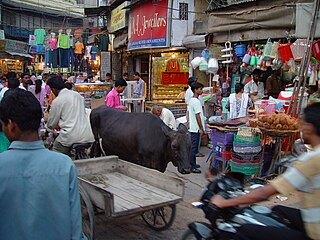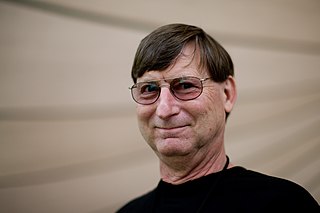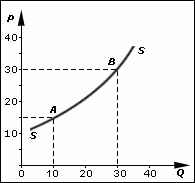
Microeconomics is a branch of mainstream economics that studies the behavior of individuals and firms in making decisions regarding the allocation of scarce resources and the interactions among these individuals and firms. Microeconomics focuses on the study of individual markets, sectors, or industries as opposed to the national economy as whole, which is studied in macroeconomics.

Monopolistic competition is a type of imperfect competition such that there are many producers competing against each other, but selling products that are differentiated from one another and hence are not perfect substitutes. In monopolistic competition, a company takes the prices charged by its rivals as given and ignores the impact of its own prices on the prices of other companies. If this happens in the presence of a coercive government, monopolistic competition will fall into government-granted monopoly. Unlike perfect competition, the company maintains spare capacity. Models of monopolistic competition are often used to model industries. Textbook examples of industries with market structures similar to monopolistic competition include restaurants, cereals, clothing, shoes, and service industries in large cities. The "founding father" of the theory of monopolistic competition is Edward Hastings Chamberlin, who wrote a pioneering book on the subject, Theory of Monopolistic Competition (1933). Joan Robinson published a book The Economics of Imperfect Competition with a comparable theme of distinguishing perfect from imperfect competition. Further work on monopolistic competition was undertaken by Dixit and Stiglitz who created the Dixit-Stiglitz model which has proved applicable used in the sub fields of international trade theory, macroeconomics and economic geography.
An oligopoly is a market in which control over an industry lies in the hands of a few large sellers who own a dominant share of the market. Oligopolistic markets have homogenous products, few market participants, and inelastic demand for the products in those industries. As a result of their significant market power, firms in oligopolistic markets can influence prices through manipulating the supply function. Firms in an oligopoly are also mutually interdependent, as any action by one firm is expected to affect other firms in the market and evoke a reaction or consequential action. As a result, firms in oligopolistic markets often resort to collusion as means of maximising profits.
In microeconomics, economic efficiency, depending on the context, is usually one of the following two related concepts:
The Master of Public Policy (MPP), is one of several public policy degrees. An MPP is a master's-level professional degree that provides training in policy analysis and program evaluation at public policy schools. The MPP program places a focus on the systematic analysis of issues related to public policy and the decision processes associated with them. This includes training in the role of economic and political factors in public decision-making and policy formulation; microeconomic analysis of policy options and issues; resource allocation and decision modeling; cost/benefit analysis; statistical methods; and various applications to specific public policy topics. MPP recipients serve or have served in the public sector, at the international, national, subnational, and local levels and the private sector.
Managerial economics is a branch of economics involving the application of economic methods in the organizational decision-making process. Economics is the study of the production, distribution, and consumption of goods and services. Managerial economics involves the use of economic theories and principles to make decisions regarding the allocation of scarce resources. It guides managers in making decisions relating to the company's customers, competitors, suppliers, and internal operations.
Microeconomic reform comprises policies directed to achieve improvements in economic efficiency, either by eliminating or reducing distortions in individual sectors of the economy or by reforming economy-wide policies such as tax policy and competition policy with an emphasis on economic efficiency, rather than other goals such as equity or employment growth.
David Marc "Dave" Kreps is a game theorist and economist and professor at the Graduate School of Business at Stanford University. The Stanford University Department of Economics appointed Kreps the Adams Distinguished Professor of Management. He is known for his analysis of dynamic choice models and non-cooperative game theory, particularly the idea of sequential equilibrium, which he developed with Stanford Business School colleague Robert B. Wilson.

Hal Ronald Varian is Chief Economist at Google and holds the title of emeritus professor at the University of California, Berkeley where he was founding dean of the School of Information. Varian is an economist specializing in microeconomics and information economics.

In economics, supply is the amount of a resource that firms, producers, labourers, providers of financial assets, or other economic agents are willing and able to provide to the marketplace or to an individual. Supply can be in produced goods, labour time, raw materials, or any other scarce or valuable object. Supply is often plotted graphically as a supply curve, with the price per unit on the vertical axis and quantity supplied as a function of price on the horizontal axis. This reversal of the usual position of the dependent variable and the independent variable is an unfortunate but standard convention.
Advanced Placement (AP) Microeconomics is a course offered by the College Board as part of the Advanced Placement Program for high school students interested in college-level coursework in microeconomics and/or gaining advanced standing in college. The course begins with a study of fundamental economic concepts such as scarcity, opportunity costs, production possibilities, specialization, and comparative advantage. Major topics include the nature and functions of product markets; factor markets; and efficiency, equity, and the role of government. AP Microeconomics is often taken in conjunction with or after AP Macroeconomics.

Samuel Stebbins Bowles, is an American economist and Professor Emeritus at the University of Massachusetts Amherst, where he continues to teach courses on microeconomics and the theory of institutions. His work belongs to the neo-Marxian tradition of economic thought. However, his perspective on economics is eclectic and draws on various schools of thought, including what he and others refer to as post-Walrasian economics.
Economics education or economic education is a field within economics that focuses on two main themes:

Sir Richard William Blundell CBE FBA is a British economist and econometrician.

Microfoundations are an effort to understand macroeconomic phenomena in terms of economic agents' behaviors and their interactions. Research in microfoundations explores the link between macroeconomic and microeconomic principles in order to explore the aggregate relationships in macroeconomic models.
The American Economic Journal is a group of four peer-reviewed academic journals published by the American Economic Association. The names of the individual journals consist of the prefix American Economic Journal with a descriptor of the field attached. The four field journals which started in 2009 are Applied Economics, Economic Policy, Macroeconomics, and Microeconomics.

Andreu Mas-Colell is an economist, an expert in microeconomics and a prominent mathematical economist. He is the founder of the Barcelona Graduate School of Economics and a professor in the department of economics at Pompeu Fabra University in Barcelona, Catalonia, Spain. He has also served several times in the cabinet of the Catalan government. Summarizing his and others' research in general equilibrium theory, his monograph gave a thorough exposition of research using differential topology. His textbook on microeconomics, co-authored with Michael Whinston and Jerry Green, is the most used graduate microeconomics textbook in the world.

The Competition and Markets Authority (CMA) is the competition regulator in the United Kingdom. It is a non-ministerial government department in the United Kingdom, responsible for strengthening business competition and preventing and reducing anti-competitive activities. The CMA launched in shadow form on 1 October 2013 and began operating fully on 1 April 2014, when it assumed many of the functions of the previously existing Competition Commission and Office of Fair Trading, which were abolished.
Georg Heinrich von Weizsäcker is a German economist and currently the Professor for Microeconomic Theory and Applications at the Humboldt University of Berlin. His research interests include microeconomics, experimental economics, financial decision making, game theory and decision theory. In 2017, Weizsäcker's contributions to a better understanding of expectations formation and decisions under uncertainty were awarded the Gossen Prize.
David Alexander Cesarini is an associate professor in the Department of Economics & Center for Experimental Social Science at New York University, a Faculty Research Fellow at the National Bureau of Economic Research, as well as affiliated researcher at the Research Institute for Industrial Economics (IFN). He is an empirically oriented economist with interests in social-science genetics, applied microeconomics and behavioral economics—especially known for his research in genoeconomics and the heritability of economic behaviors and attitudes, such as investing decisions and confidence.








